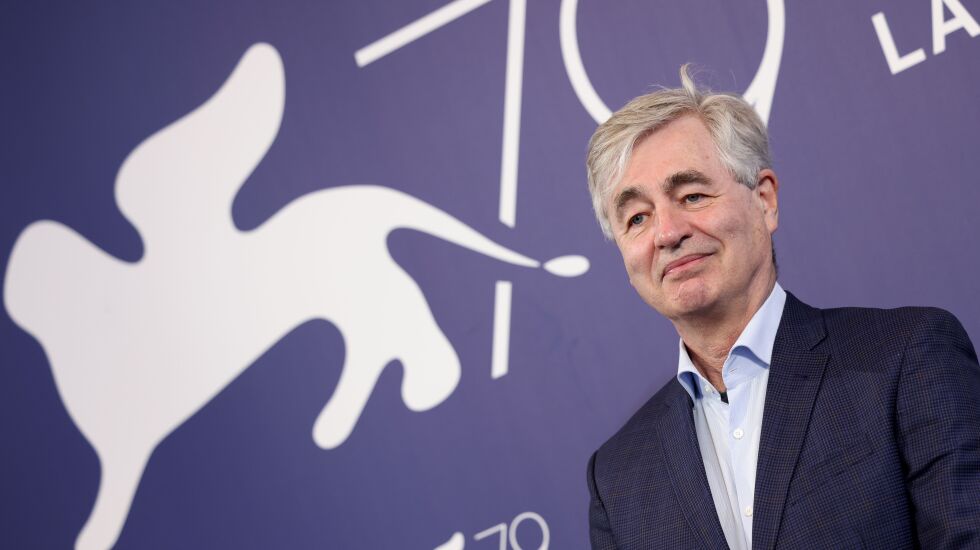
Director Steve James moved to Chicago in adulthood, and has since centered much of his work — projects including “City So Real” and “America to Me” — on his adopted hometown.
His newest documentary, which open the Chicago International Film Festival on Wednesday, has a different focus. It centers on a love story, a sense of conviction and a deadly secret, with Chicago as a background setting for much of the film.
James goes behind the scenes of how a passionate leftist and gifted scientist managed to avoid prosecution for sharing U.S. secrets with sworn enemies and explores the ambiguous morality behind his decision.
“The Compassionate Spy” begins in 1944, when 18-year-old Ted Hall was recruited to work on the Manhattan Project to create an atomic bomb for potential use against the Soviet Union.
Motivated by empathy for the Soviet people, the University of Chicago student gave information about the bomb to the Soviets to even the nuclear playing field. Viewers can see how Hall deals with his moral quandaries through reenacted scenes, mostly filmed on location in Chicago.
Loyalty wasn’t a black and white issue for Hall. He was born in New York City, but his family was born in Russia. Hall felt connected to the people of the USSR, and the film shows he was scared about what would happen if the United States achieved a monopoly on nuclear weapons.
His secret became his wife’s to carry, too. Joan Hall urged him to not confess, despite interrogation and constant surveillance from the FBI and death sentences for others convicted of much less. Joan herself, now in her 90s, sheds light during the film on how Hall’s decision came to be, and her steadfast commitment to him.
This nuanced story didn’t come to James’ attention until the last few years, when he discovered interviews conducted with Hall before his death in 1999. In these interviews, included in the documentary, Hall shares his side of the story.
“It’s such an unknown and remarkable story that I thought it would be great to tell it, and I think part of it was that it was about a part of history that many Americans don’t know much about and don’t learn much about,” said James, an Oscar nominee for his editing on the Chicago basketball classic “Hoop Dreams” (1994) and as director-producer of the feature “Abacus: Small Enough to Jail” (2017)

The film avoids taking a stance on whether the 18-year-old did the right thing. In fact, one of Hall’s own children interviewed is adamant that he made the wrong decision.
But Hall’s wife was the one person who never had misgivings about his controversial decision.
“She so firmly believes that what Ted did was the absolute right thing to do,” James said. “You hear from Ted that he had some misgivings and might have done things differently had he not been as naive about the Soviet Union.”
Much of the action of the film takes place in Chicago: The Halls initially met and lived in Chicago but fled the city when the FBI began questioning Ted. Almost all of the film’s crew was from Chicago, James said.
James, who lives in Uptown, said he hopes Hall’s compassion resonates with younger generations.
The young physicist was disturbed by the American attitude after dropping the atomic bomb on Japan, the film shows.
“I didn’t feel any mood of jubilation at all, I felt that this was not a good sign for the future,” Hall says of the initial atomic bomb test.
“The thing you have to remember is that the Soviet Union was working on the bomb,” James added. “Ted is the reason they got it sooner, and we can’t know what would have happened if he hadn’t done what he’d done. We do know the only nation to have dropped an atomic bomb on anybody was the United States.”
Hall went on to become a successful scientist, and never spoke about his secret, not even with his kids.
He didn’t share his story until he was very ill with Parkinson’s disease. By that time, the government chose not to prosecute him.
“He must have taken some satisfaction in seeing it out while he was still alive,” James said. “But the thing about Ted was he never did this for notoriety. He didn’t do it for fame, he did it out of principle.”







